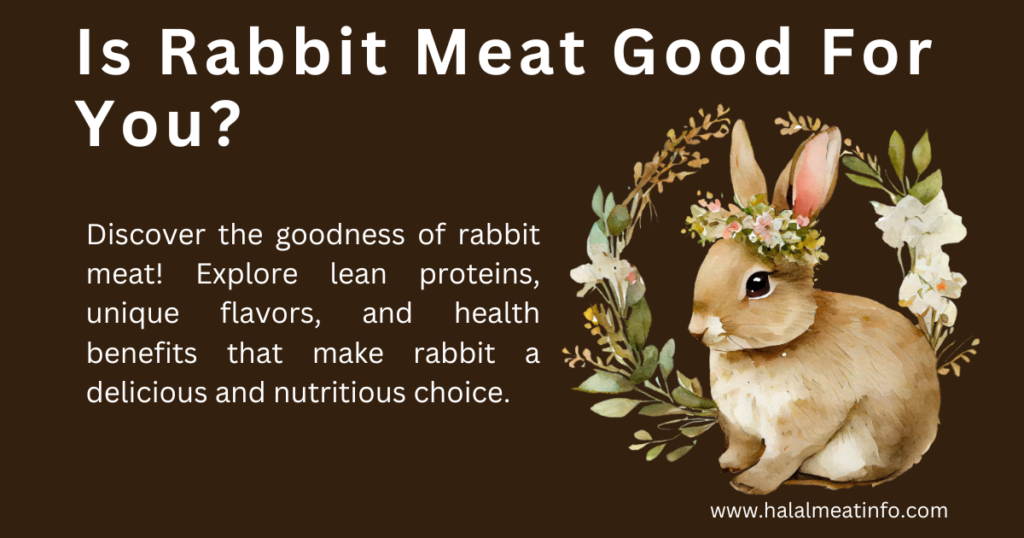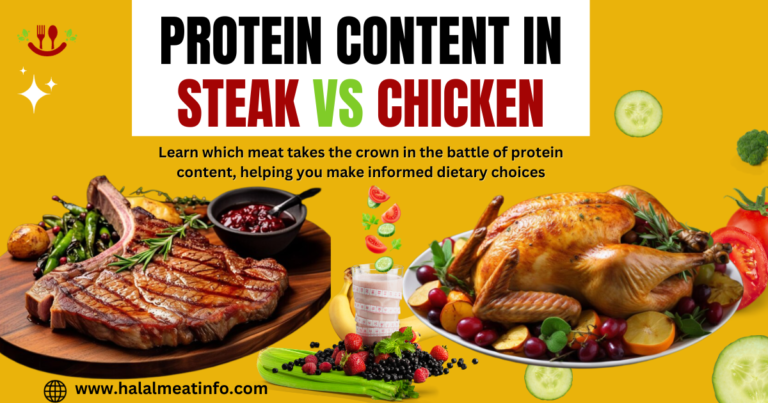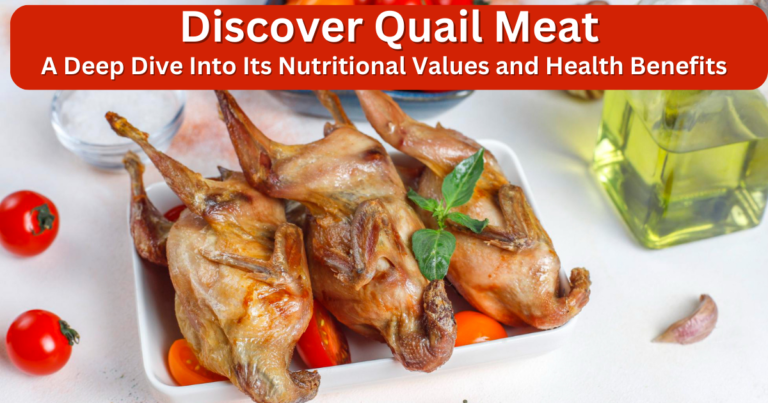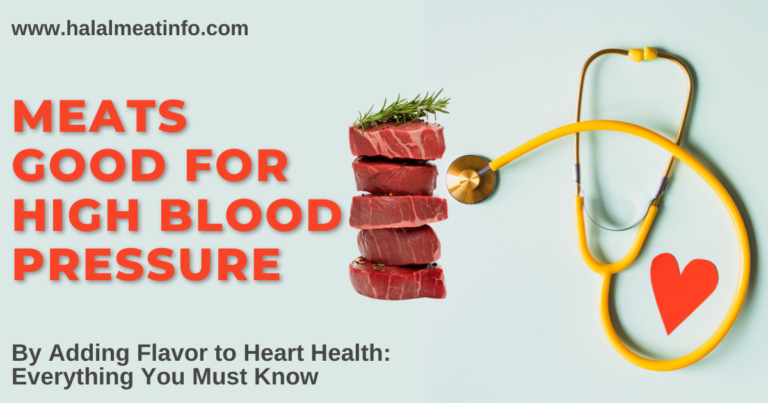Is Rabbit Meat Good For You?
Rabbit meat frequently doesn’t get the attention it deserves when it comes to investigating various meat options for a healthful diet. The purpose of this investigation is to clarify a frequently asked question, “Is rabbit meat good for you?”. We investigate the nutritional makeup of meat from rabbits. We also look at the effects eating rabbit meat has on health. To present a fair and impartial viewpoint on the consumption of rabbit meat is our goal. Both foodies and those who are concerned about their health will find this blog post interesting. Continue reading if you’re looking for new protein sources.

The Nutritional Value of Rabbit Meat
Rabbit meat is a highly nutritious source of protein, offering a lean and healthy alternative to traditional meats such as beef, pork, or chicken. It is low in saturated fat and cholesterol, making it a heart-healthy choice for those looking to improve their diet. Additionally, rabbit meat is rich in essential vitamins and minerals, including B vitamins, iron, and zinc, which are vital for maintaining good health and overall well-being.
Protein Content
One excellent source of protein is rabbit meat. All of the necessary amino acids needed for muscle growth and repair are present in it. Regarding this, the United States Department of Agriculture (USDA) has offered some information. They state that there are roughly 29 grams of protein in 100 grams of rabbit flesh. It’s interesting that this is greater than beef and chicken combined. It’s an excellent option for people who are mindful of their fat intake. It permits an increase in protein without adding harmful lipids.
Low in Fat and Cholesterol
The fat and cholesterol content of rabbit meat is substantially lower than that of other meats. This makes it the perfect option for anyone who want to lower their chance of cardiovascular disease and maintain a healthy weight.
Comparative Analysis: Rabbit Meat vs Other Meats
There are some fascinating differences between rabbit and other popular protein sources like chicken and beef. As was previously noted, 100 grams of rabbit meat provides about 29 grams of protein, which is more than the protein that chicken and beef provide. The meat from rabbits also wins out in terms of fat content because it has less saturated fat than beef and chicken. As a result, it’s a great option for anyone trying to cut back on saturated fat.
The iron content of hare meat provides an additional benefit. Although rabbit meat isn’t as high in iron as beef is, it does have a higher iron level than chicken. Additionally, rabbit meat excels in providing omega-3 fatty acids, a nutrient that is frequently linked to fish more so than meat. Its reputation for heart health is partly attributed to its richness of omega-3.
Thus, when evaluated based on these nutritional criteria, rabbit meat performs comparably, and in certain cases, better than these other well-liked protein sources.
See our thorough guide on Is Rabbit Meat Halal? for additional details regarding the halal status of rabbit meat.
Health Implications of Rabbit Meat Consumption
Let’s examine the health effects of eating rabbit meats now that we are aware of its nutritional worth.
Health Benefits
Because of its high nutritional content, eating rabbit meat can have a number of positive health effects. First and foremost, its high protein content contributes to muscle growth and repair, which makes it a great option for individuals who regularly exercise. Iron helps prevent anemia by ensuring healthy red blood cell production. Rabbit flash also contains magnesium and potassium, which support healthy bones and cardiac function, respectively. Because rabbit has less saturated fat, it’s a heart-healthy choice that lowers the risk of cardiovascular illnesses. Additionally, rabbit flash’s omega-3 fatty acids are linked to a host of health advantages, such as lowered inflammation, strengthened heart health, and possibly even enhanced cognitive function. Consequently, adding bunny meat to your diet may be a first step toward a more nutritious and well-balanced lifestyle.
Potential Risks and Downsides
Although rabbit meat has many nutritional advantages, there are some drawbacks and hazards to be aware of. First of all, negative responses could result from allergies or sensitivities that certain people may have to bunny meat. Furthermore, there is a lot of sodium in rabbit flash, which may be dangerous for people who already have heart disease or high blood pressure. In addition, rabbit meat, like other meats, can harbor foodborne diseases if improperly prepared or handled. Purchasing rabbit from reliable, regulated vendors is essential, as is making sure it is cooked through before eating. Lastly, compared to other meats, bunny meat can be more expensive and harder to find, which may make it less viable for certain people to include on a regular basis in their diets. When considering whether or not to include rabbit in your diet, keep these things in mind.
Incorporating Rabbit Meat into your Diet
Now that we know that, when consumed in moderation, rabbit meat can be beneficial to your health, let’s look at some methods to include it in your diet. There are several ways to prepare hare meat, such as roasting, grilling, and stewing. It is a flexible component that can be used in many recipes in place of chicken due to its mild flavor and soft texture. You can even attempt preparing bunny meat in traditional ways from various countries, such Italian cacciatore or Spanish paella. Furthermore, rabbit is a tasty addition to any dish because it goes well with a wide range of herbs and spices.
FAQs
100 grams of rabbit meat contains approximately 29 grams of protein.
Yes, Hare meat is significantly lower in fat and cholesterol compared to other meats.
Yes, bunny meat is rich in essential nutrients like iron, B vitamins, and omega-3 fatty acids.
Yes, potential allergies, high sodium content, and the presence of foodborne pathogens are some risks.
It can be roasted, grilled, stewed, or used as a replacement for chicken in many dishes.
Conclusion
In summary, rabbit meat offers a number of health advantages and is a very nutritious and healthful source of protein. Because of its high level of vital nutrients and minimal fat and cholesterol, it’s a great option for anyone trying to maintain a balanced diet and get healthier overall. But, before eating rabbit meat, make sure all safety precautions are taken and that the right handling and cooking techniques are used. Because of its wonderful flavor and adaptability, rabbit meat can bring diversity to your diet and support a well-rounded nutritious regimen. So go ahead and try rabbit meat—your body will be grateful!






